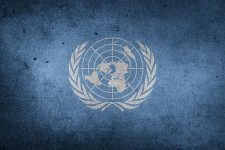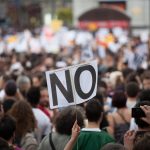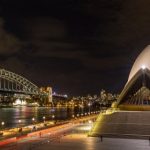Australia’s Shift Towards Totalitarianism

A suite of harsh anti-protest laws were passed by the NSW parliament on March 17 this year. The legislation has increased police powers to prevent public protests and created a new offence of “aggravated unlawful entry on inclosed lands.”
Among other things, the new laws mean protesters who are alleged to be interfering with a business being conducted on inclosed lands – including mines – can receive a criminal record and be fined up to $5,500.
The laws broadened the definition of a mine to include coal seam gas projects, and increased the maximum penalty for actions like locking onto equipment to seven years imprisonment.
But NSW is not alone. Tasmania passed tough anti-protesting laws in 2014, while Western Australia’s proposed laws are before parliament.
The silencing of detention centre workers
The Australian Border Force Act 2015 passed before federal parliament in May last year. It established the Australian Border Force: the agency that now looks after customs, border protection and immigration.
The legislation provided that “immigration and border protection workers” are barred from revealing “protected information.”
A maximum penalty of two years imprisonment applies for breaching this law, which effectively works as a gag on speaking out about human rights abuses and conditions in immigration detention centres.
However, it came to light on Thursday that an amendment has been made to this legislation, after a group called Doctors for Refugees challenged the provision.
Health professionals can now speak out about conditions and medical treatment in immigration detention centres, although all other staff still have to remain silent.
Australians are all too aware of the range of legislation restricting public outcry and protest that’s been enacted over recent years. But it now seems the international community is taking note.
The UN Rapporteur
On Tuesday, United Nations Special Rapporteur Michel Forst took aim at the recent laws and policies that are “constraining the rights” of Australian human rights defenders.
After a two-week fact-finding visit to the country, Mr Forst issued his end-of-mission statement. In it, he stated that the Australian government had to “dispel civil society’s growing concerns” about the “chilling effect” its policies are having.
The UN independent expert said he’d expected a “safe and enabling environment” for human rights defenders, as the nation is a constitutional democracy with a free media.
Instead Mr Forst found a range of measures that are whittling away at basic legal safeguards and protections.
Restrictive new laws
Along with “proliferating” anti-protest laws and the “stifling” Border Force Act, Forst noted that the federal government has introduced a bill that will prevent environmental groups from mounting legal challenges against major projects.
He also condemned the nation’s “intensifying secrecy laws.” On October 13 last year, the federal government’s new data retention regime came into effect.
It requires telecommunication companies to retain customers’ metadata for the period of two years. This data can be accessed by 21 government agencies, and are already being misused by police and local councils.
A “safeguard” system of “journalist information warrants” was put in place under the new regime, which are required if a government agency wants to identify a journalist’s source. However, a number of journalists have already been targeted for speaking out against government policies, suggesting the warrants are not difficult to obtain.
Indeed, the warrants are issued in secret and just reporting their existence can result in two years behind bars.
Funding cuts for advocacy bodies
Mr Forst also accused the Australian government of cutting funding to a number of peak bodies, due to their advocacy on issues such as “immigration, security, environment and land rights protection.”
The Abbott government cut funding to the Environmental Defenders Office on July 1 2014. The EDO is a nationwide network of legal centres that provide representation on environmental cases deemed to be in the public interest.
The National Congress of Australia’s First Peoples lost its funding that same year. The Turnbull government this year refused to restore funding to the independent representative body for Aboriginal and Torres Strait Islander peoples.
While the National Association of Community Legal Centres are facing a 30 percent funding cut as of July 1 next year. The centres are a network of independent not-for-profit organisations providing legal services to the poorest and most marginalised members of society.
Gag clauses
Mr Forst went on to say that bodies still receiving government funding have to abide by “gagging clauses in their funding agreements”, which instruct them against “lobbying” the government or engaging “in public campaigns.”
A group of Queensland’s community groups joined together in July this year, to lobby the Palaszczuk government for stronger protections that ensure they can advocate and criticise the government without the threat of having their funding cut.
According to Mr Forst, “environmentalists, whistleblowers, trade unionists and individuals like doctors, teachers, and lawyers protecting the rights of refugees” are all subject to “frequent public vilification.”
This is at the hands of “senior government officials,” with business interests and the media following suit.
The persecution of Gillian Triggs
Forst gave the example of Australian Human Rights Commission president Gillian Triggs, who refused to resign from her position in the face “highly personalised” government pressure last year.
This came after she released the commission’s report on the impact of long-term immigration detention on children.
Australian attorney-general George Brandis asked Ms Triggs to resign and said the government had lost confidence in her. While then prime minister Tony Abbott claimed the damning report was “a political stitch-up.”
Recommendations
“The Australian Government has historically made commendable efforts in pursuit of its human rights obligations,” Mr Forst said. He added that “it is unfortunate that the combination of the detrimental laws and practices” have had such a devastating effect on the nation.
However, he does believe the situation can be turned around.
He recommended the government start to rebuild the “confidence of human rights defenders”, and he urges the government to consider “a national action plan on human rights, through meaningful consultation” with the public.
Mr Forst was appointed to the position of UN Special Rapporteur on the situation of human rights defenders in 2014. He has a background in human rights issues, especially the rights of defenders.
He’ll be presenting his final report to the UN Human Rights Council and the Turnbull government next year.
But will it have an impact?
Many Australians will be pleased that an organisation like the United Nations is focusing on the developments that are currently taking place in the country.
But it’s yet to be seen whether the UN report will actually ruffle the feathers of the present government and reignite the free voice of human rights defenders.






